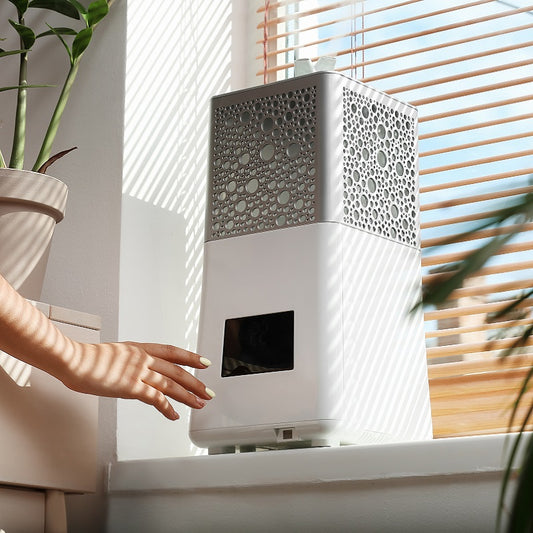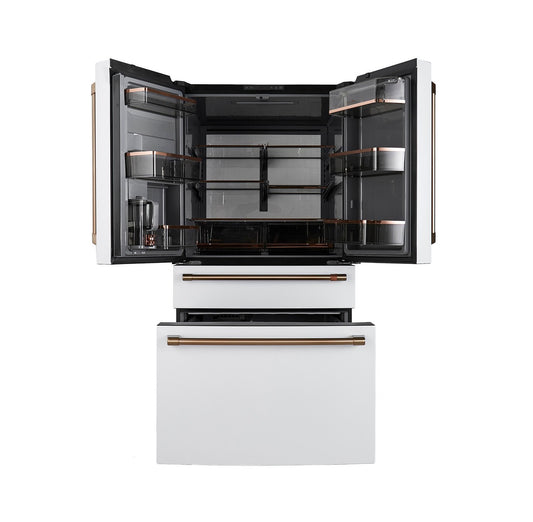Have you ever noticed spots or streaks on your newly washed dishes, or worse, the buildup of limescale in your built-in dishwasher and other home appliances? Hard water could be the culprit. Hard water contains minerals such as calcium and magnesium that can impact the effectiveness of your dishwasher and leave your dishes looking cloudy and dull, even when you use more dishwasher pods or detergent. That's where water softeners come in. They are specially designed to treat hard water, improving the overall performance of your dishwasher, water heater, and other appliances. In this article, we will explore what water softeners are, how they work, and the key benefits of using them at home to provide you with spotless dishes and prevent scale buildup.
Understanding Hard Water and Its Effects
Do you notice white spots on your dishes after running them through the dishwasher? This could be due to hard water. Hard water contains minerals such as calcium and magnesium, which react with soap to create soap scum and leave behind mineral deposits on surfaces. These mineral deposits can affect the performance of your dishwasher, leading to cloudy glassware and decreased efficiency. Hard water can also cause skin irritation and dryness, as well as damage to plumbing and appliances over time. Understanding the composition and effects of hard water is crucial to protecting your home and appliances so you can begin the process of water treatment. Fortunately, with the use of a water softener system, you can eliminate the negative effects of hard water on your dishes, skin, and appliances.

The Science of Ion Exchange in Water Softening
When hard water enters a water softener, ion exchange takes place -- an essential process that removes minerals responsible for water hardness. This process involves resin beads that attract and exchange the minerals with sodium ions, which do not cause hardness in water. Water softeners act as a mineral tank for the beads to begin removing hard water minerals. Resin beads are tiny, porous spheres that are charged with sodium ions. As hard water flows through the resin tank, the mineral ions such as calcium and magnesium attach to the resin beads, while the sodium ions are released into the water. The result is softened water that now contains sodium ions instead of mineral ions. The ion exchange process is continuous, and the resin beads require regeneration to remove the minerals trapped in them. This involves using a brine solution that flushes the minerals out of the resin beads and recharges them with sodium ions to continue the ion exchange process.
Understanding ion exchange is essential in comprehending the science behind water softening and how it effectively removes hardness-causing minerals from water.
Key Components of a Water Softener System
Understanding the essential components of a water softener system is crucial in comprehending how it works. The system comprises various parts that cooperate to achieve an effective softening process, eliminating the minerals that make water hard. These components include:
- The Brine Tank – This mineral tank stores the water softener salt used to regenerate the resin beads that remove the hard minerals from the water.
- The Resin Tank – In the resin tank, resin beads attract the hard and heavy minerals through an ion exchange process, effectively softening the water.
- The Control Valve – The control valve regulates the water flow, initiating the resin tank's backwash or regenerating cycle.
- The Regeneration Cycle – The regeneration cycle is responsible for flushing the resin beads with the brine solution to remove the hard minerals captured during operation.
All these components play a significant role in ensuring that a water softener system functions efficiently. Gain a deeper understanding of the functions of each part and how they work hand in hand to have the best possible results.

Benefits of Using a Water Softener at Home
If you're still wondering whether a water softener is right for you, these benefits might convince you. Firstly, you'll notice an immediate improvement in your dishwashing performance. Hard water can leave spots and streaks on your glassware and dishes, and you'll be amazed at the difference soft water can make. You'll also be able to use less detergent, as soap lathers better in soft water. Another significant advantage is the increased lifespan of your appliances and pipes. Hard water can cause scale buildup in your pipes, which can ultimately lead to clogs and reduced water flow. This scale can also damage dishwashers, washing machines, and other household appliances that use water. A water softener can help prevent this problem and extend the life of your machinery by improving the water quality. Aside from the kitchen, water softeners offer benefits for your skin and hair. Soft water is gentler on the skin and can help prevent dryness and irritation. Your hair will also be softer and easier to manage, preventing damage from hard water buildup. Finally, soft water is better for your clothes, and you'll notice brighter, cleaner fabrics after washing. Investing in a water softener can also save you money in the long run. You'll use less soap and detergent, which equates to lower monthly expenses. You won't need to replace your appliances as frequently, as they won't break down due to scale buildup. Additionally, soft water is more energy-efficient, as appliances that run on soft water don't need to work as hard to do their job.
The benefits of using a water softener at home are numerous. Not only will you achieve sparkling dishes, but you'll also enjoy softer skin, shinier hair, cleaner clothes, and a healthier plumbing system. Consider investing in a water softener today and see the difference for yourself.
Installation and Maintenance of Water Softeners
Installing a water softener system requires careful consideration and attention to detail. Start by selecting a suitable location for the system, taking into account factors such as accessibility and drainage. Avoid exposing the system to extreme temperatures or sunlight. Once you have determined the location, it's time to start the installation process. Begin by shutting off the main water supply and draining the pipes. Then, connect the water softener unit according to the manufacturer's instructions, making sure to properly secure each component. After you have successfully installed the system, it's important to prioritize regular maintenance to ensure its optimal performance. This includes routine cleaning to prevent the buildup of mineral deposits and other impurities. It's recommended to schedule a professional inspection and cleaning at least once a year. Additionally, you should regularly check and replenish the salt supply in the brine tank to ensure the regeneration process can effectively remove minerals from the resin beads. Proper maintenance not only extends the lifespan of your water softener but also ensures that it continues to provide you with high-quality, soft water for years to come.
- Consider placing a cover over your system to protect it from weather and other outdoor elements.
- Perform monthly checks to ensure the system is running correctly and address any issues promptly.
- Regularly test the water hardness to determine if your unit needs adjustments.
Now that you understand the importance of water softeners in enhancing your dishwasher performance, it's time to take action. Investing in a water softener system can alleviate hard water problems and ensure that your dishes come out looking spotless every time. Not only will a water softener improve the quality of your dishes, but it can also prolong the lifespan of your appliances and save you money in the long run. Remember, the science behind water softening is simple but effective. Through ion exchange, a water softener removes the minerals that cause water hardness and replaces them with sodium ions. The result is soft water that is free of impurities and ready to use. Installing a water softener is a wise decision for any household. Not only will it improve the quality of your water, but it can also have a positive impact on your overall health. Say goodbye to scale buildup and hard water stains, and start enjoying the benefits of soft water today by purchasing a dishwasher with water softener at Town Appliance.







